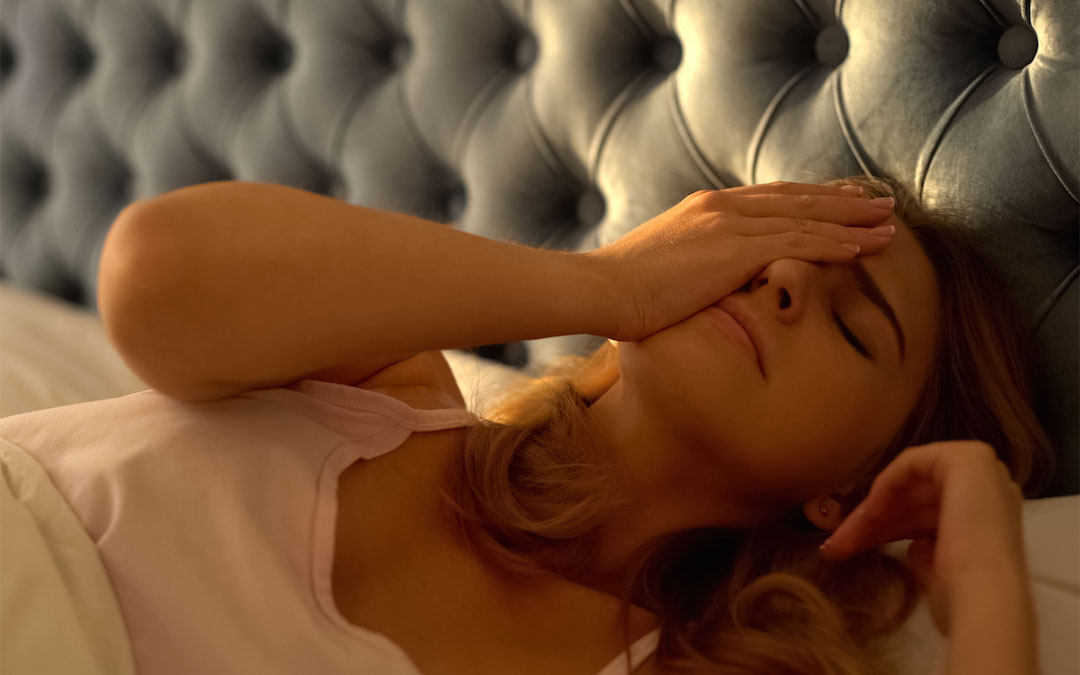A good night’s sleep has long been considered a natural antidote for migraine headaches.
Now, as we enter 2020, new research indicates this centuries-old solution is backed by scientific data. Poor sleep has been increasingly linked to both migraine pain and frequency in recent years.
Sleep disorders, like sleep apnea, also contribute to triggering and making headaches worse.
The growing connection between sleep and migraines ultimately places a premium on quality, uninterrupted rest.
Whether you suffer from headaches every day or the occasional migraine that derails your work and personal life, it’s important to understand this link — and how you can put yourself in the best position to avoid migraines due to poor sleep.
Does Sleep Help Migraines?
The short answer to this common question is yes: A good night’s sleep is a critical tool that helps your body counteract headaches.
Conversely, poor sleep has been shown to foster migraines. A new study, led by Dr. Suzanne Bertisch, a Boston-based physician and Harvard medical professor, highlights this connection.
The results, published in the journal Neurology in December, showed a sharp increase in migraines following a night of interrupted sleep. Interestingly, the migraine headaches typically impacted the participants not on the day immediately following poor sleep, but on the day after.
Researchers looked at 98 adults who experienced frequent headaches, but less than 15 per month overall. On average, the participants were 35-years-old and suffered at least 2 migraines per month. All participants had their sleep habits tracked for six weeks, with participants taking notes in a diary on how they felt during the night and when they woke up, as well as wearing a device that helped researchers monitor the quality of their sleep. By the end of the study, more than 4,000 days worth of data were compiled, with the participants suffering about nine migraines on average over the course of the six weeks.
Quality of Sleep More Important Than How Much Sleep You Get for Migraines
The results underscored what many have held true for countless years: there is a strong link between sleep and migraines. Yet the quality of sleep, rather than the quantity, ended up being the primary factor at play.
Participants who had less than 6.5 hours of sleep didn’t see a noticeable uptick in migraines the next day or the day after that. Sleep deprivation did not play a significant role in migraine frequency, the study found. Instead, “sleep fragmentation,” or time spent in bed but not asleep, was the most important indicator.
The key takeaway: Participants who reported poor sleep quality — punctuated by extended periods of sleep fragmentation where they were waking up during the night — were 39% more likely to experience migraines two days after their bad night of sleep.
In other words, the effects of poor sleep quality typically didn’t impact people immediately afterward; the connection between a night of interrupted sleep and severe headaches was delayed.
A good night’s sleep — characterized by a lack of sleep fragmentation, rather than simply spending more than 6.5 hours in bed — contributed to less frequent and less intense migraines.
“Our findings provide new data showing that while nightly short sleep duration does not appear to trigger migraine, variability in sleep fragmentation temporally precedes migraine onset,” the researchers concluded.
How Sleep Quality Contributes to Migraines
The research team led by Dr. Bertisch built on findings from another sleep study for migraines.
In 2017, University of Michigan researchers showed dopamine levels dropped and fluctuated during migraine headaches. Dopamine is an important neurotransmitter that helps regulate emotion and sensory perception; it’s known as the “feel-good” neurotransmitter because it is released when we experience pleasure.
The study concluded lower dopamine levels makes people more sensitive to pain and stimulation.
This goes hand-in-hand with common migraine symptoms, which include:
- Nausea
- Vomiting
- Irritability
- Pain caused by bright lights
- Fatigue
- Stress
- Dizziness
- Sensitivity to noise
These painful, throbbing headaches can last up to three days long.
Dopamine regulation — or the brain’s ability to avoid wild fluctuations in dopamine levels — is supported by quality sleep. Dopamine is primarily released when we wake up, helping us stay alert and feel awake. This process is inhibited after a night of interrupted sleep, however, and disrupts the body’s natural circadian rhythms. The amount of dopamine receptors in the brain are significantly reduced when you’re unable to stay asleep during the night — increasing the odds you’ll suffer a migraine due to fluctuations in dopamine levels.
This ties back to the results from Dr. Bertisch’s team.To produce dopamine, the body needs to get quality rest and avoid sleep fragmentation. Production is at its peak during deep sleep, which comes during the third and fourth stages of the four sleep cycles. Reaching those final two stages, though — which includes REM sleep, the period of the night tied to dreams — is impossible when a high volume of sleep interruptions occur. Those sleep fragmentations block your body from entering deep sleep and impairs your natural dopamine regulation.
Sleep Apnea Migraines?
With sleep fragmentation strongly linked to migraines, it’s worth looking at causes of sleep fragmentation — and whether they can be treated.
Sleep apnea, in particular, is a common factor in nightly sleep interruptions. Sleep apnea symptoms include snoring, fatigue, lapses in breathing during the night, and headaches.
While there isn’t an overwhelming amount of research on the connection between sleep apnea and migraines, a few studies suggest treating sleep apnea helps curtail painful headaches.
One study, in the journal Headache, looked at 82 participants that suffer from severe headaches; more than 70% of the participants routinely dealt with migraines, and 63% of participants suffered from sleep apnea. All of the participants were being treated by a neurologist for their consistent headaches.
The researchers’ objective was to look at whether treating sleep apnea with CPAP (continuous positive airway pressure) cut down on the number of headaches the participants experienced.
The results showed treating sleep apnea with CPAP led to a marked improvement in their headaches. About 78% of the participants with sleep apnea who were CPAP adherent “were more likely to have improvement in headaches than patients intolerant of CPAP,” who were treated with other forms of medical therapy, according to the study.
The researchers concluded headache patients should be evaluated for sleep apnea, after treating sleep apnea led to considerable improvement in headaches for many study participants.
Related: How Will I Know If I Have Sleep Apnea?
There are other contributors to sleep fragmentation that should be examined. Restless leg syndrome and insomnia are two other well-known factors in sleep fragmentation. Treating those issues will help minimize sleep disturbances throughout the night — and by cutting back on sleep fragmentation, should help reduce migraine frequency.
Next Steps to Take to Help Reduce a Migraine Headache
If you’ve been dealing with chronic or episodic migraines, the pain can often be overwhelming. But there are steps you can take to try and reduce the number of migraines you’re experiencing.
Keep a Sleep Journal
One recommendation is to keep a diary where you keep notes on your sleep quality and patterns. Keep the diary by your bed at night. If you wake up, jot down a quick note on the time and what you are feeling. Keeping track of how many times you wake up during the night, and looking at the gaps in between your stimulations, will provide useful data for any sleep specialist you see.
Improve Sleep Hygiene
It’s also important to provide yourself the best sleep circumstances possible. Eliminating or reducing certain nighttime activities will give your body a better chance of completing the four sleep cycles and combating throbbing headaches.
Here are five suggestions to follow:
- Avoid eating big meals within three hours of going to sleep
- Don’t exercise within four hours of going to sleep
- Restrict your caffeine intake at night
- Limit your exposure to blue light, which stems from mobile devices, before bed
- Make sure your room is as dark as possible when going to sleep
Following these simple steps will fight many of the things that keep our minds racing in bed. Remember, the focus is on reaching deep sleep and avoiding nighttime disturbances. By cutting back on blue light exposure and late-night exercise, you’ll be helping your body relax and fall asleep quicker.
And to help make sure you avoid these common pitfalls, creating a sleep schedule is another worthwhile move.
Create a Sleep Schedule
A sleep schedule is important because it helps you find your body’s natural rhythm, and maintain your body’s internal clock so you can fall asleep and wake up more easily.
Your sleep schedule should include the time you want to be in bed by and the time you want to wake up (typically your bedtime is based on your wake time). It should also include when you want to eat your last meal of the day and activities you can do while preparing for bed, like reading.
This is especially important for travelers. Jet lag is often tied to pulsating headaches. To defend against migraines, avoid long naps and stick to your sleep schedule as best you can when traveling; this will help your body adjust to the new time zone and decrease the likelihood you’ll spend time in bed awake.
Seek Treatment for Sleep Disorders That Can Contribute to Migraines
If you suffer unknowingly from sleep apnea or have been diagnosed but aren’t adhering to a PAP protocol, there is only so much you can do on your own to counteract migraines.
If you suspect you’re suffering from sleep apnea but haven’t yet been evaluated or sought diagnosis, Sleep Centers of Middle Tennessee can help. Our team can also help create positive health outcomes if you’ve been diagnosed but are still seeking treatment.
Contact us today to find out what to expect as a new patient.
References
Bertisch, Suzanne, et al. (2019). Nightly sleep duration, fragmentation, and quality and daily risk of migraine. Neurology, Dec 2019. Retrieved on January 10, 2020 from:
https://n.neurology.org/content/early/2019/12/16/WNL.0000000000008740
DaSilva, Alex, et al. (2017). Dopamine D2/D3 imbalance during migraine attack and allodynia in vivo. Neurology, April 2017. Retrieved on January 10, 2020 from:
https://www.ncbi.nlm.nih.gov/pubmed/28356463
Volkow, Nora, et al. (2012). Evidence that sleep regulation downregulates dopamine D2R in ventral striatum in the human brain. The Journal of neuroscience: the official journal of the Society of Neuroscience, 32 (19), 6711-6717. Retrieved on January 10, 2020 from:
https://www.ncbi.nlm.nih.gov/pmc/articles/PMC3433285/
Johnson, Karin, et al. (2012). Improvement in headaches with continuous positive airway pressure for obstructive sleep apnea: A retrospective analysis. Headache: the journal of head and face pain. Retrieved on January 10, 2020 from:
https://headachejournal.onlinelibrary.wiley.com/doi/abs/10.1111/j.1526-4610.2012.02251.x


